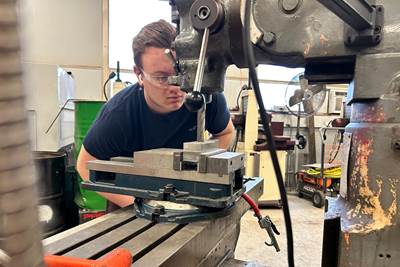An Open Letter to Kids About Machines and the World of Making Things
This is an open letter to middle- and high-school students about choices they’ll soon face. It is also an introduction to Career and Technical Education (CTE), the world of CNC machining, and a reminder that there are options outside of the traditional four-year college path.
Share






Photo Credit: Getty Images
Hey, kid!
You’re probably reading this because you’re under the age of 16 and your mom or dad or teacher or maybe your weird uncle sent the link to you. You have things to do so I’ll keep this short.
You should probably know that at some point soon, you’re going to be asked to decide something big. You’re going to be asked to make a decision so big that most kids your age won’t be able to do it.
The question you’ll be asked will be something like this:
WHAT ARE YOU GOING TO DO WITH THE REST OF YOUR LIFE?
Hilarious! Is it even possible to know what you’re going to do for the rest of your life? I mean, some kids your age do know, or think they know, and that’s great! But most kids don’t know, and that’s normal.
Still, at some point soon, you will be asked the “rest of your life” question, which might be phrased as, “What do you want to do when you grow up?” And then you’ll probably be asked where you plan to study for that. Do you want to go to a typical four-year college or university?
Do you?
If you do, great! But if you’re not sure, then you need to know there are options for you — options other than four-year colleges and ways to learn skills that can lead to great jobs that pay well and are pretty easy to find.
One thing you can do right now is find out if your high school has a “CTE” program. If you haven’t heard about this already, CTE is short for Career and Technical Education. Most public high schools in the United States — probably including yours — have their own CTE programs or allow kids to attend CTE classes at other schools. (Lots of schools do this, where you can literally take a bus from your regular school to a different school to learn something you think is interesting.)
CTE classes can teach you many different skills, including nursing and healthcare, construction, computer programming, agriculture, audio-visual technologies and even cooking. But the type of CTE classes that I want to talk about fall under the category of manufacturing — specifically, a type of manufacturing called “CNC machining.”
“Machining” is really just a term that means you are using a machine to make something. In our case, we’re mainly talking about taking a chunk of metal and using a “machine tool” to shape that metal chunk into a specific part — a part that will help create anything from a jet engine to a Jacuzzi. So, what is a machine tool?
Think about the common tools around your house: a hammer, a screwdriver, a drill. A machine tool — sometimes called a “CNC machine” or a “machining center” — is basically just a large tool that happens to be a machine, and they can cut all kinds of metal, or drill it, mill it or grind it, to create specific shapes. CNC machines use computer code (CNC stands for computer numerical control) that tell the machine how to make the part. And this is where things get interesting.
The things that machine tools can make are vast! Just look around you. I’ll bet that within 10 feet of you there is something that required a machine tool to make: your phone, your refrigerator, cars, bikes, electronics, airplanes or even the handles of your desk. All of these things have to come from somewhere, right? Well, that somewhere was likely a “machine shop,” which is a place that uses machine tools to make parts.
When it comes to the world of making things, it turns out we are in a very interesting time. There was a time not long ago when a lot of businesses in the United States decided to make their parts in faraway countries where people work for less money. The idea was that American companies could save money by using machine shops in cheaper countries to help make their products, rather than having those products made in American shops. It still happens a lot today, but since the time you were born a lot has changed!
Today, more and more people are realizing that making things here is a better idea, even if it is more expensive because we try to pay our workers fairly. And that’s truly great! But here’s the problem: Because so many companies are starting to make things in this country again, there are a lot of available jobs at machine shops across the United States. Tens of thousands of jobs. And that number is only going to increase by the time you’re an adult.
So. Is the world of CNC machining and “making things” a good choice for you? Are CTE classes something you should try while you’re in high school?
Well, ask yourself:
- Are you a visual learner?
- Do you like the idea of a job where you don’t have to sit at a desk all day wearing uncomfortable clothes?
- Do you often learn better by doing things rather than reading about them?
- Does the thought of owing a ton of money to banks as soon as you become an adult sound like a bad idea? (Here I’m talking about college student loans. Be careful!)
- Do you like to make things?
If you answered yes to questions 1 through 5, you definitely need to check out your school’s CTE program. You will get to have an experience that most of the other kids at your school won’t. In the world of machining, you will learn to make things, and the work you’ll do will be an important part of what makes our country strong.
We’ll end with a fun fact: Did you know that if you focus on a CTE education in high school, eight years after you graduate, you will — on average — make more money than your classmates who did not focus on CTE? It’s true. And you can take that to the bank.
Read Next
The Resurgence of 'Shop Class' in American High Schools
From the 1990s through the 2010s, most traditional “shop classes” disappeared from middle schools and high schools across the U.S. — one of the many issues that helped create today’s skilled labor shortage in metalworking and CNC machine shops. Here’s one solution that deserves more attention.
Read MoreBuilding Out a Foundation for Student Machinists
Autodesk and Haas have teamed up to produce an introductory course for students that covers the basics of CAD, CAM and CNC while providing them with a portfolio part.
Read More

























